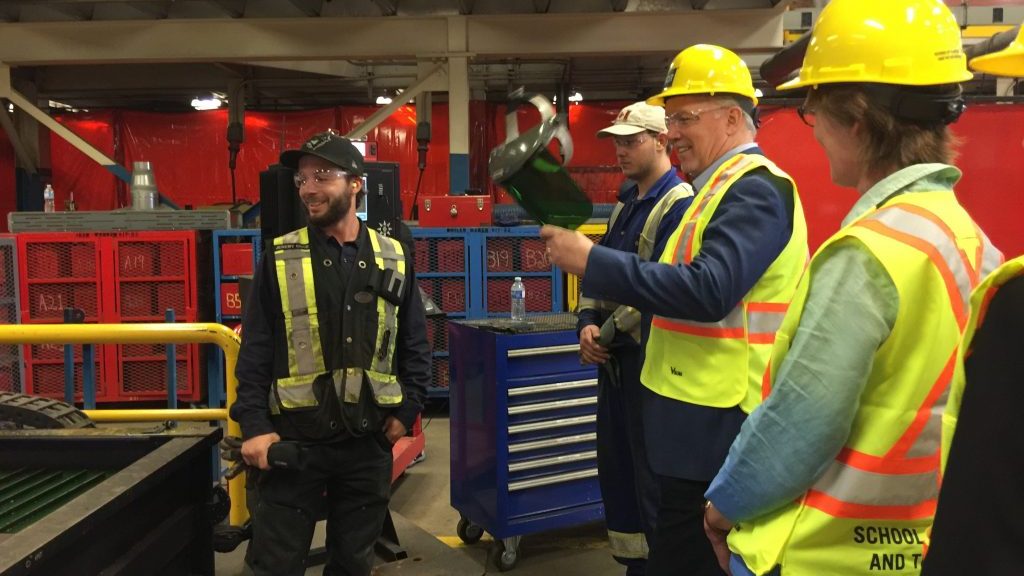Projects approved, projects delayed and labour agreements were the top issues for the industry for 2018 and will shape the next year.
The community benefits agreement (CBA) framework introduced by the Government of British Columbia in July was one of the most controversial topics to hit the western Canadian construction industry in some time.
“It’s the biggest story of the year, because for the first time in decades the provincial government made the decision to say if you want to work on a provincially funded infrastructure project, you have to be a member of not just any union but a Building Trades union,” said Independent Contractors and Businesses Association of BC (ICBA) president Chris Gardner.
“Freezing out 85 per cent of these workers doesn’t make sense, will increase cost to taxpayers and affects everything from completion to safety to schedule of the project.”
Progressive Contractors Association of Canada president Paul de Jong said at first blush B.C.’s CBA framework “sounded fairly typical, where public infrastructure projects should show emphasis on local hiring and on opportunities for Indigenous people, women and youth. Many in industry are also familiar with these expectations.
“But the CBA framework added on significant challenges, one of them being a government employer managing the projects, which introduces issues of risk,” de Jong said.
He added he objected to Building Trades union membership as a requirement to work on public infrastructure.
“It’s a costly type of infrastructure framework, and one that violates workers’ rights. It’s ironic in that respect because the fundamental goal was to draw more workers into the industry, but it will do the opposite,” de Jong claimed.
BC Building Trades executive director Tom Sigurdson said the CBA framework “is a controversial issue, but if we don’t look after the continued supply of opportunities for apprentices, we’ll have a very severe skill shortage in seven to eight years.
“The same group that was opposed to CBAs fully supported the previous provincial government’s evisceration of trades in the first place, so nothing has changed in terms of ideologies,” he added.
British Columbia Construction Association (BCCA) president Chris Atchison said the CBA story will continue into 2019.
“If they decide to expand the union requirement beyond the Trans-Canada Highway, Highway 1 Kamloops to Alberta Border Four‐Laning Project and the Pattullo Bridge, that’ll be the biggest story,” he said.
Regardless of the CBA framework, Atchison said, BCCA’s strategy is to provide meaningful recruitment and retention programs for women, youth, Indigenous people and new Canadians.
“Union membership shouldn’t matter. We want to amend the culture of construction so we can embrace change,” Atchison said.
While CBAs dominated discussion in 2018, an equally important story is the approval of LNG Canada’s $40-billion liquified natural gas (LNG) project in Kitimat, B.C.
There’s a deep concern that we are no longer open for business
— Paul de Jong
Progressive Contractors Association of Canada
“It’s the single largest private sector investment in Canadian history. A lot of work has been done for the past number of years, and the final investment decision is a message of confidence for the province,” Sigurdson said.
“It’s enormously important for Canada and for B.C.,” Gardner added. “Because of the size and scale of the investment, it will have implications for jobs and attracting talent. It’s also important because it will establish Canada as a new exporter of LNG in the global marketplace.”
Canada will be on the map as an LNG supplier primarily for Asian markets looking to transition from coal and oil to cleaner burning fuels, he explained.
“In our view, LNG Canada cannot be an outlier. It was nearly across the line, and then we had a change in both federal and provincial governments. To the credit of both the Liberals federally and the NDP provincially, they made a commitment and got it across the line,” Gardner said.
The federal government buyout of the Trans Mountain pipeline from Kinder Morgan was another significant event for the construction industry in 2018.
The federal purchase of the pipeline “created a whole ripple of analysis on whether governments should step in to save industries, and is the government creating the problem they mean to fix by stepping in?” de Jong asked.
“There’s a deep concern that we are no longer open for business, we lack the will to provide jobs, and we’re bogged down in a senseless over layering of regulatory approval.”
Gardner echoed de Jong’s concern and said regulatory and tax changes in both Victoria and Ottawa would make the road to a final investment decision more difficult for future large-scale projects.
Regarding Trans Mountain, he said, every court challenge and step in the process was fulfilled, “and yet it hasn’t happened.”
“Now the federal government owns a significantly sized project and we still don’t have visibility on when shovels will be in the ground. In no other jurisdiction would this happen,” Gardner said.
Atchison said the primary issue for his membership is the ongoing shortage of skilled workers for the construction industry.
“Sixty-eight per cent of our membership say it’s their biggest challenge, regardless of labour affiliation, and they’re also struggling to find enough trained and experienced managers to replace those retiring from the workforce,” he said.
Cultural factors such as a male-dominated workforce threaten to make the problem worse, Atchison added.
“We have a long way to go with a workforce where only 4.7 per cent are women. It will take a concerted effort by leadership before construction can attract and retain tradespersons,” he said.
Last year’s reports of opioid overdose deaths in the trades also create a stigma for the industry, Atchison noted.
“One death is too many, but we see articles putting an unfair stigma on construction. We see this as a societal issue, not a select industry issue. It’s a scourge, and we all have to lean in (to solve it),” he said.
A glimpse at a portion of the community benefits debate in 2018
Community benefits survey raises eyebrows among industry skeptics
Industry opponents take community benefits fight to B.C. Supreme Court
Industry Voices Op-Ed: Who really benefits from B.C.’s public infrastructure rules?
Industry Voices Op-Ed: Building Trades shares ‘truth’ on Community Benefits Agreements
New report questions efficiency of community benefits agreements
Industry Voices Op-Ed: It’s time to stand together for B.C.’s construction industry
Industry Voices Op-Ed: Separating fact from fake on the B.C government’s infrastructure deal
Industry Voices Op-Ed: It’s time to leave the BC Construction Association











Recent Comments